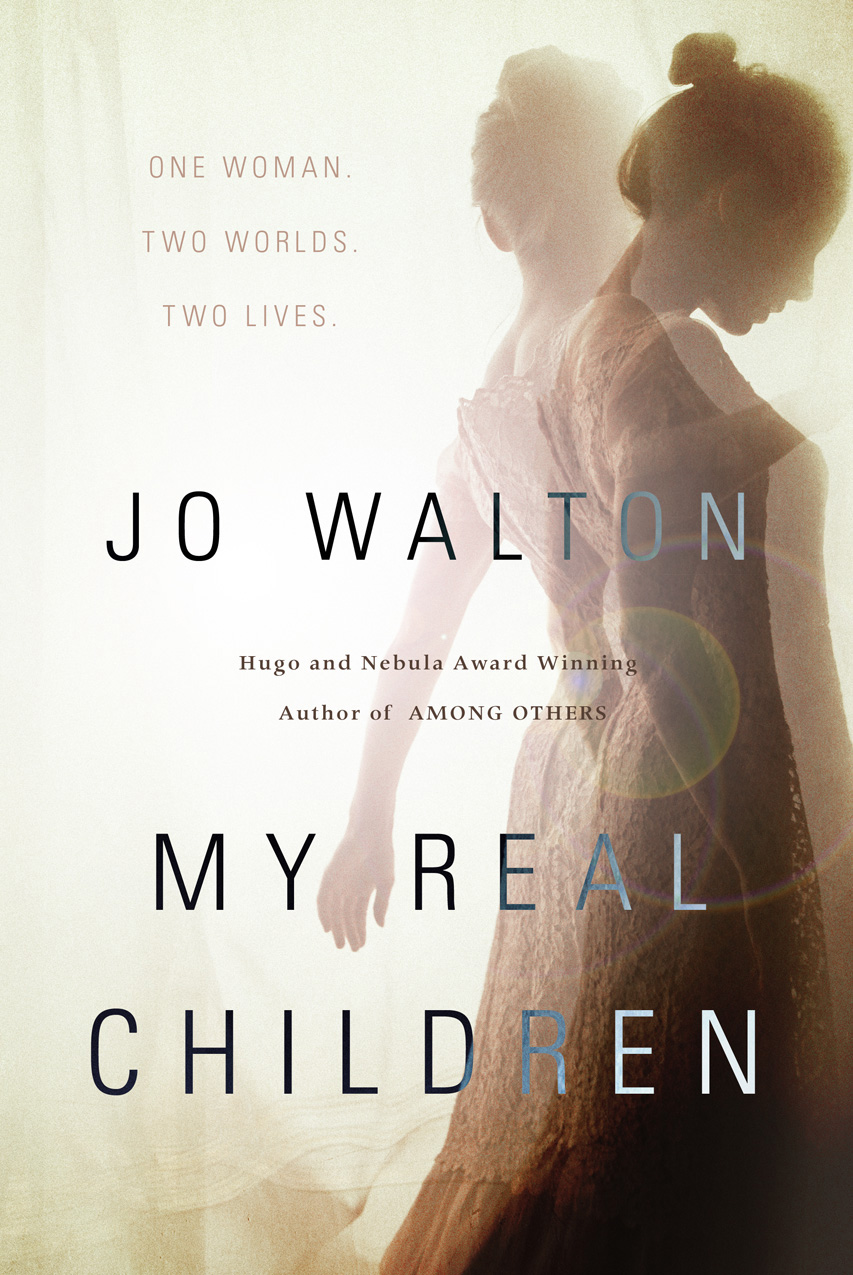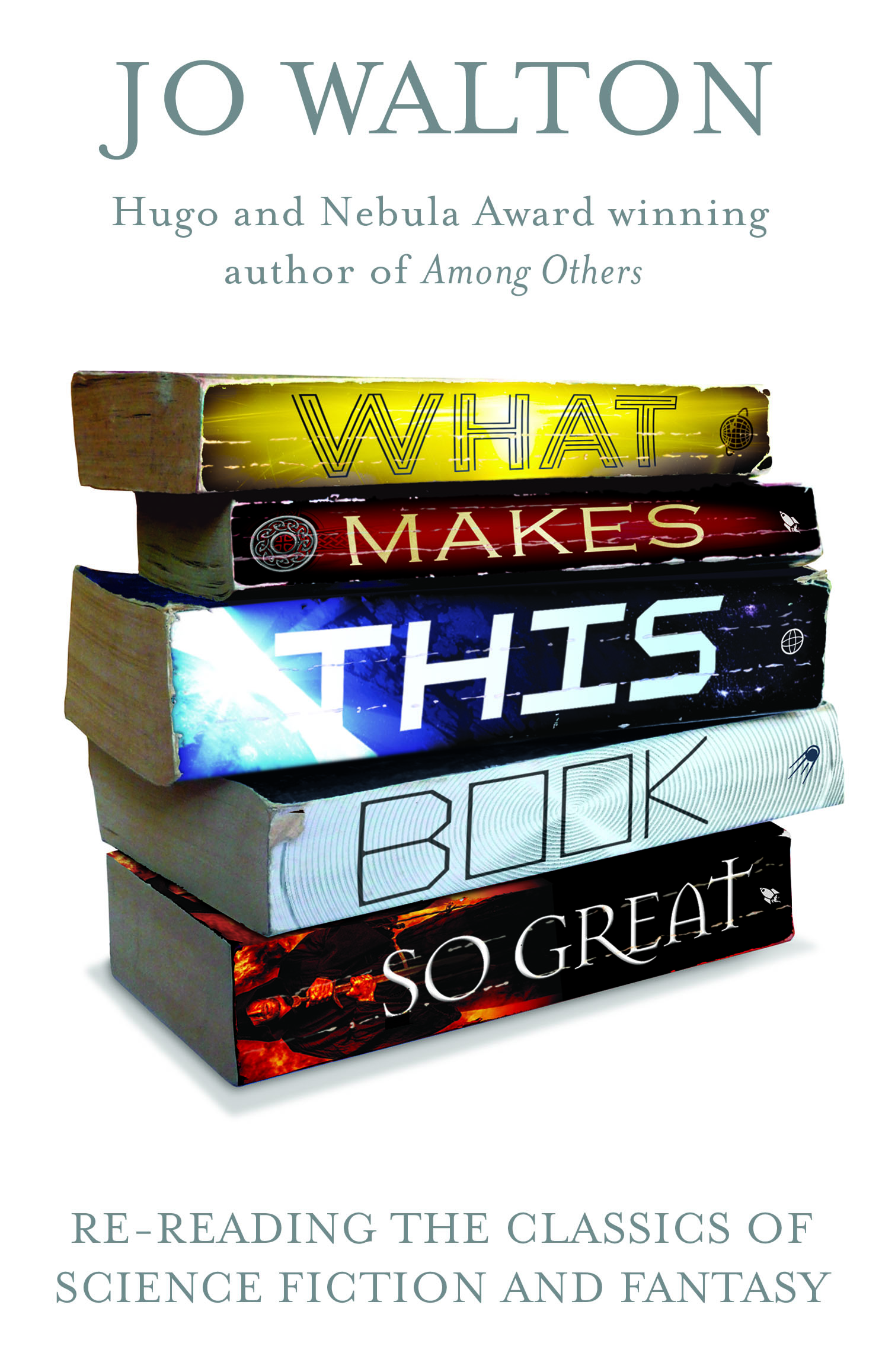I could cheat and say I don’t decide these things, they decide me, but that would be cheating.
I think part of is was growing up when there were very few cool parts for girls in the kinds of books I liked. I had no problem identifying with male characters ever that I can remember, but terrible difficulty identifying with Pollyanna and Katy and Elsie Dinsmore. I was always happier when there was a tomboy, an “exception” — Jo March, Nancy Blackett, George. I think if I’d been a man the “men are one way and women are another” message would have gone past me without a ripple, because it only snagged on me because if men were one way and women were another I was definitely coming up on the male side, the exception side. I remember taking great feminist comfort from C.S. Lewis when I was about fourteen and all my female friends were turning into Susan, both that I had a way of categorising it and that I had a contrasting voice telling me it wasn’t a good thing or an unavoidable thing.
There was a pervasive idea in fiction that men have honour and adventures and women are beautiful and sexually monogamous. Men’s possible victory conditions top out at conquering the world, women’s top out at being beautiful and marrying someone wonderful who loves you.
So yes, I wanted more and better female characters (or “girls’ parts” as I used to think of them) to identify with. I wanted more female choices. But by the time I came to be writing the Sulien books really there were lots — not 50%, but lots, it wasn’t 1980 it was 1998, and there had been a whole generation of books growing up in there, and I’d been reading them. (Having said that, at about that time the only female character I could think of who actually conquered the world was Pyanfar Chanur.)
But I didn’t do it feeling there weren’t any, or even really that there weren’t enough, because to some extent there was already a cliche there, I did it because I wanted to.
What I wanted to write, or what I had a very strong sense of, the place I started from in writing my two “jock on a horse” novels, was the idea of a middle-aged women who had fought as a young woman for the sheer joy of it, and who was now responsible for other people, dutifully coming back to the colours to fight again as a duty. There’s a scene about a quarter of the way through The King’s Name which is actually the core of what I started with — though I actually wrote it as a poem.
So I had this poem, and I looked at it, and I turned it around and looked at it again, and I asked myself what world the poem came from, because it wasn’t our world. Immediately before that I’d been writing a series of poems which I suppose are fanfic, from the POV of Eowyn, and which I had jokingly been describing as “feminist chivalric atavism”. Looking at this thing I thought well, there have been women who fought, historically, look at Sichelgaita of Salerno, look at the Scythian graves, but there have never been any who fought as a duty, they always had to really really want to, they were the exception, the girl as good as a man who does it because she wants to. And I thought about cases where warrior women had been done in recent fiction and it seemed they were almost all doing “exception” in this way.
There were men, who were like men. There were women, who were beautiful and liked clothes. Then there was Our Heroine the Exception who went out and made people eat cold girly steel, only generally she also cleaned up well and other found true love too.
I did a lot of worldbuilding background detail stuff, much of it invisible in the text, to make myself happy with the world, and I thought of all sorts of interesting things I could do with playing with Arthurian stuff and real history, and I thought how interesting it would be to do real economics and nation-building (only pro-tax books ever), and I started to write a fully immersive fantasy where about ten percent of the people fighting were women, and where if there wasn’t a direct male heir, a direct female heir came ahead of a collatoral male one. (Salic, but with direct daughter inheritance.)
In doing this, I also deliberately confronted and contrasted other female choices, because if I was saying “being a kickass warrior is a legitimate way to be female which lots of people choose”, which I was, I also wanted to add “…among many other valid and interesting female choices.”
Sulien’s a warrior, her sister Aurien never wanted any more than to learn the minimum amount of self-defense fighting, sitting sewing a seam, marrying for an alliance, and managing her husband’s estate suited her perfectly. For that matter, this would also have suited her brother Morien, but he didn’t have the chance, poor guy. I also did this directly with Elenn and Emer. I also did it with sexual choices with women who fight; Sulien (celibate), Enid (married to a colleague) and Marchel (married to someone who stays home), and Alswith (“I haven’t done it with anyone for weeks and then it was only ap Erbin!”). And there’s Garah, Sulien’s groom, who doesn’t have the weight to be a warrior but becomes a logistics organizer, and eventually a queen.
The one I really intended to use as a contrast was Sulien’s mother, Veniva, who grew up in a different world. There are huge changes in Sulien’s life, but they don’t compare to the ones in her mother’s life. Sulien is a barbarian warrior fighting for peace without knowing what it is, her mother remembers civilization. This isn’t balanced because we are always in Sulien’s POV — I’m not sorry I wrote it in first, but it does make for observer bias. There’s a conversation in chapter 2 of The King’s Name, where Veniva yells at Sulien about this “My own child thinks it’s splendid that there is acknowleged law and very few people die fighting before they are grown up, at least most years, and what’s worst is that you are right!” Veniva is an educated person from a civilization that’s gone down like a sandcastle, and over the course of the two books she becomes realistic about the world she is now in.
One of the things I’m much less happy about, at this distance, is showing legitimate male choices in traditionally female spheres. I have Masarn retiring from the ala to help his wife with her candle-making and baby-raising business, and I have Glyn doing the logistics stuff beside Elenn and Garah, and you needn’t tell me how pathetic this is because I have actually noticed.
It’s much easier, as Le Guin has said, to show women doing cool “trad male” stuff than to show men doing “trad female” stuff because there’s very little “trad female” stuff that actually impresses itself as cool in the tradition of storytelling, or at least on me. I’m trying to redress this at least a little with Lifelode, which is still a living project, though crawling forward at the moment.
Having written the two Sulien books and then The Prize in the Game, in which one sister thinks being beautiful is a profession while the other thinks a large facial scar shows she didn’t parry fast enough, I’ve since written two things that aren’t this kind of thing, and I don’t have much desire to go on and write more cold girly steel any time soon, at least not like that.
Perhaps the reason these things are attractive to people is for the same reason stories set in utopia never work. Utopias are seamless and stories happen in the cracks, and the more cracks you have, the more stories generate there. Imbalances of power create cracks, in the same way that putting together two societies with contrasting values creates cracks. Gender imbalances of power and gender-based cultural differences, give you both kinds, right in the heart of society, which can provide a lot of cracks for stories to sprout in.




